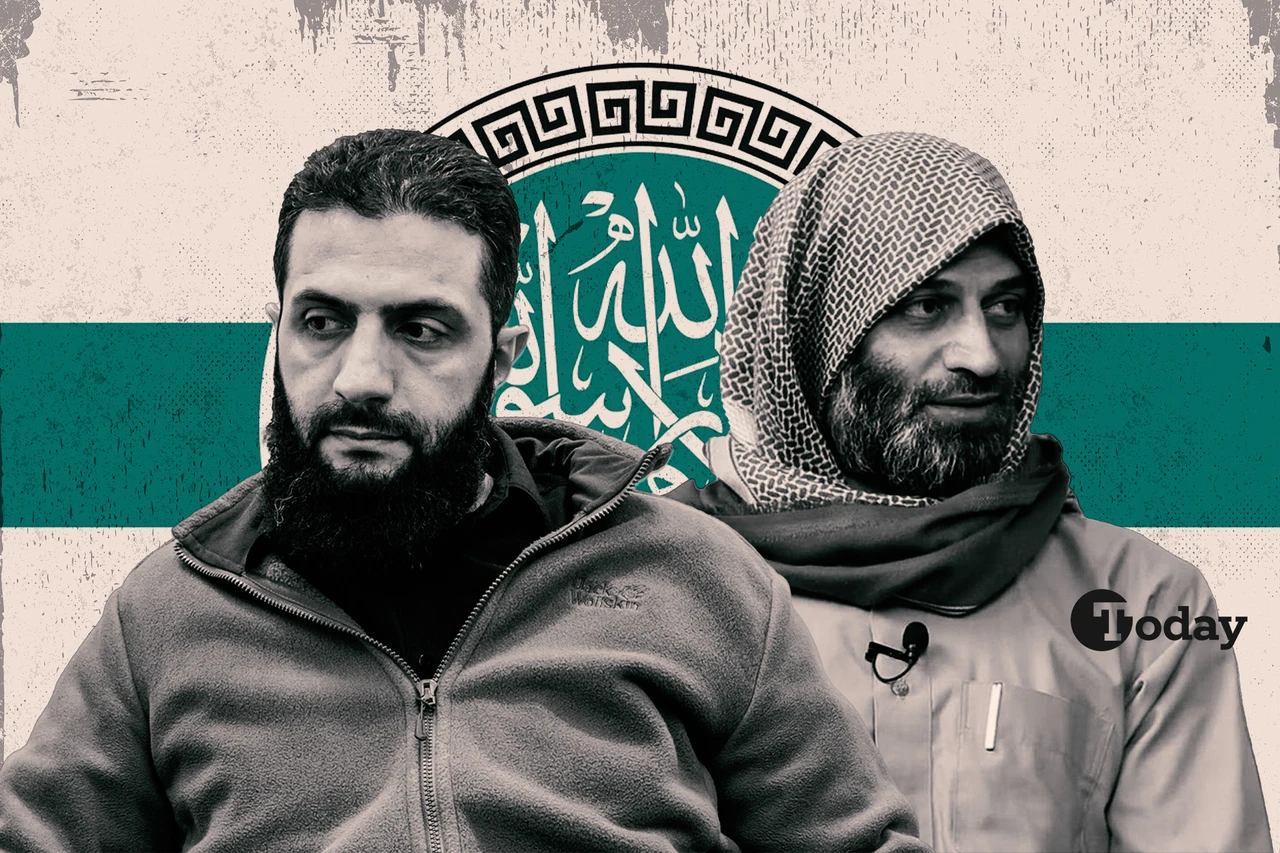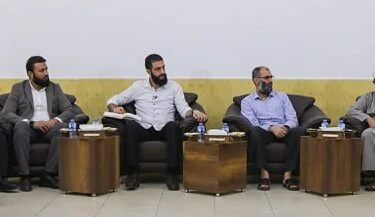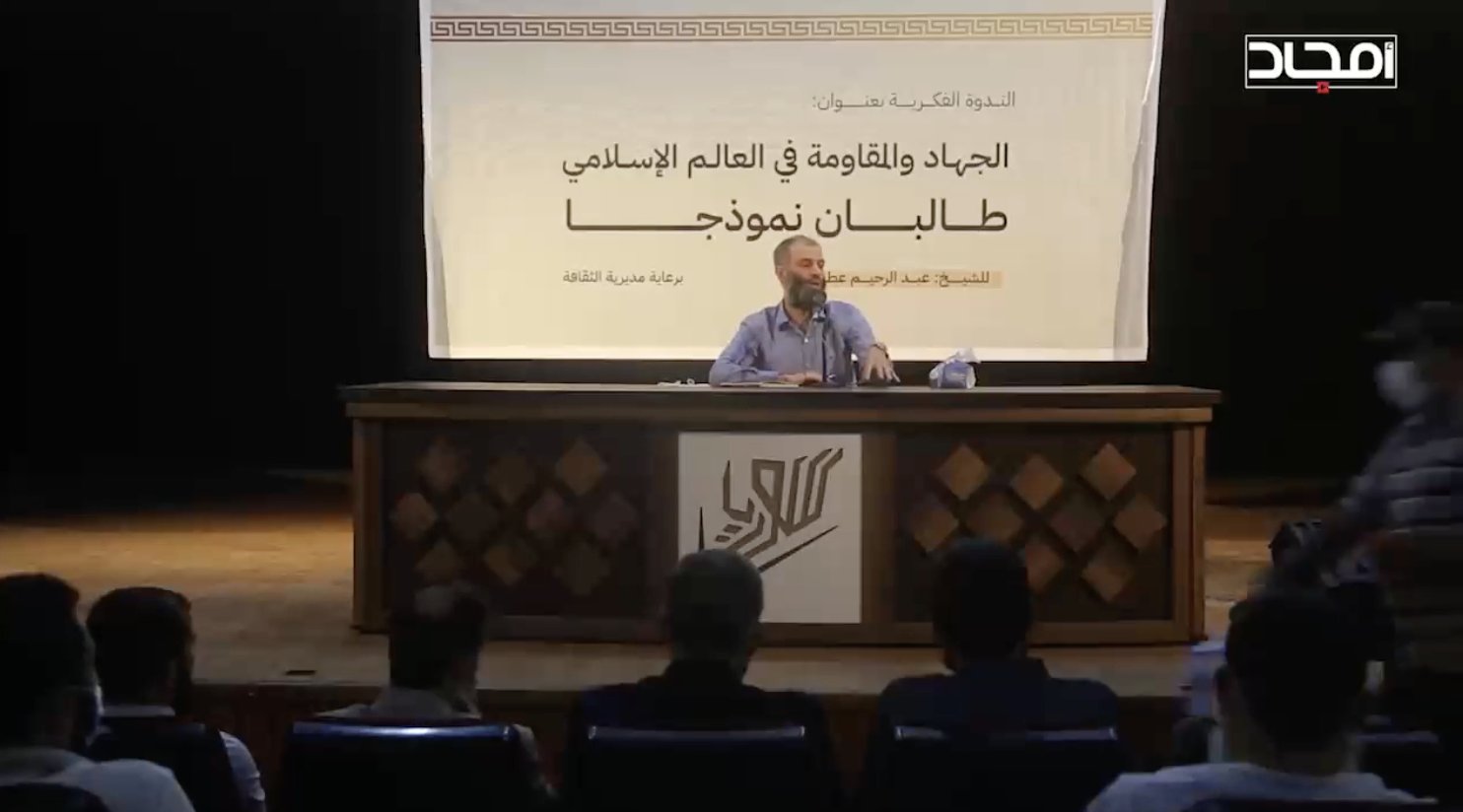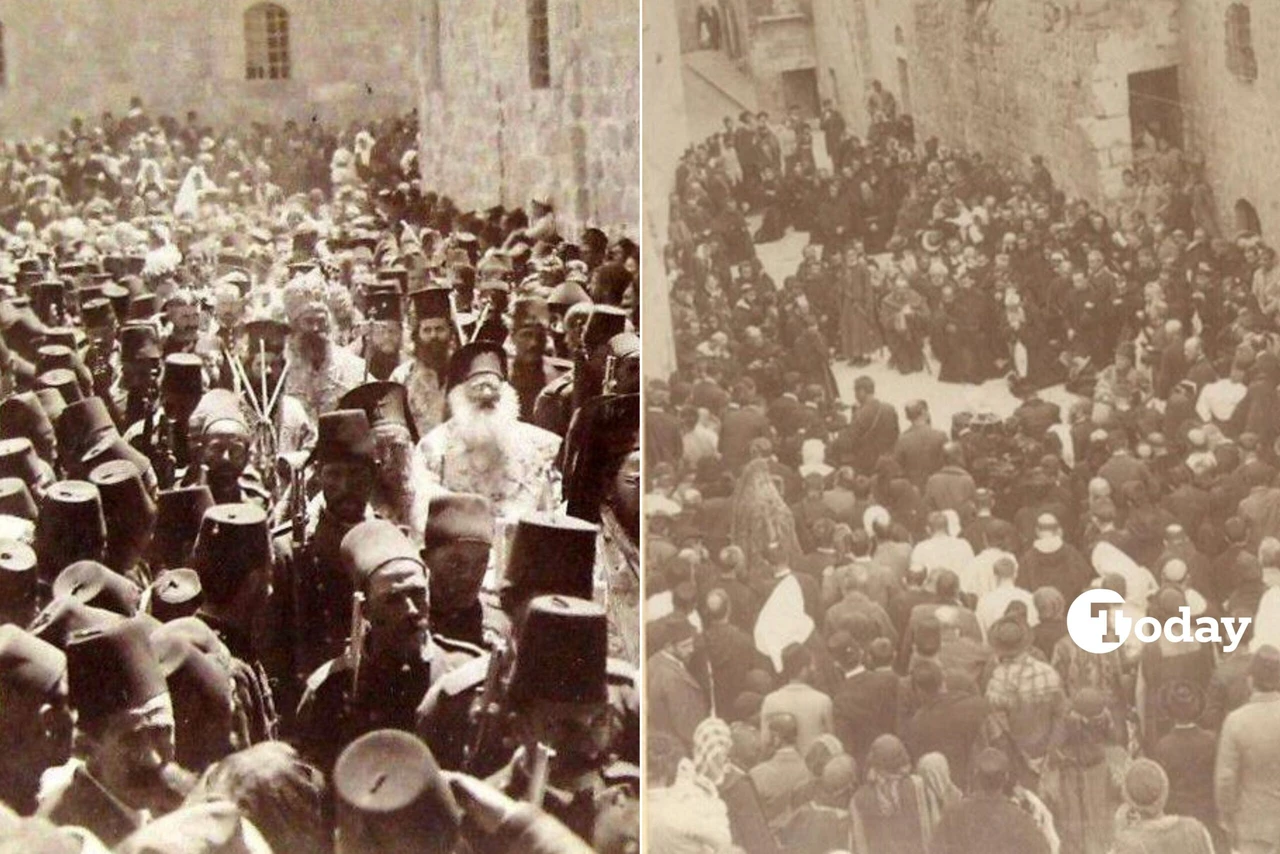Who is who? Meet HTS ideologue Abd al-Rahim Atoun, top jurist and strategist
 Ahmed al-Shaara (left) and his chief cleric, al-Atoun (right), pictured in front of the HTS logo (Collage by Mehmet Akbas/Türkiye Today).
Ahmed al-Shaara (left) and his chief cleric, al-Atoun (right), pictured in front of the HTS logo (Collage by Mehmet Akbas/Türkiye Today).
Abd al-Rahim Atoun is one of the most prominent figures within Hayat Tahrir al-Sham (HTS), the organization that dominates most of Syria now, after the capture of Aleppo, Hama, Homs and Damascus respectively alongside the SNA.
As the head of the HTS Sharia Council and a close confidant of the group’s leader Abu Mohammad al-Jolani, Atoun plays a critical role in shaping the group’s ideological, religious and political strategies, or justifying them at least. His influence has been pivotal as HTS transitions from its roots as an al-Qaeda affiliate toward a localized insurgency with aspirations of international legitimacy.


Architect of HTS’ strategy
Atoun is not just a religious authority but also a strategist who has guided HTS through Syria’s prolonged conflict, frequently receiving visits from the group’s leader. His guidance has been instrumental in transforming HTS from an al-Qaeda affiliate into a group that seeks to present itself as a nationalist movement.
Atoun has consistently advocated for a shift away from transnational extremist objectives, focusing instead on localized governance and stability in the regions that HTS controls, and in that sense, he seems to have won over Daesh’s Abu Muhammad al-Adnani. As a jurist, he formulates theological justifications for the group’s policies, including its military and governance strategies.
Atoun’s pragmatic approach is epitomized by his endorsement of the “Taliban Model,” a strategy that he believes can help HTS secure international recognition. Drawing inspiration from the Taliban’s successful negotiations with Western powers and eventual return to governance in Afghanistan, Atoun has argued that HTS should adopt a similar path by prioritizing local governance, engaging diplomatically, and marginalizing extremist factions.
Governance through Syrian Salvation Government
HTS has undergone significant transformations since its origins as Jabhat al-Nusra, an affiliate of al-Qaeda. Under Atoun’s guidance, the group has sought to distance itself from its transnational extremist roots, focusing instead on localized objectives. This shift is epitomized by the establishment of the Syrian Salvation Government (SSG), a civilian administrative body that oversees governance in HTS-controlled areas. The SSG’s creation highlights HTS’ efforts to present itself as a legitimate governing authority rather than a terrorist organization.
HTS has also targeted rival extremist factions to consolidate power and enforce its localized agenda. For example, the group has cracked down on remnants of Daesh and al-Qaeda affiliates like Hurras al-Din, as well as smaller foreign-led factions such as Jund al-Sham. These groups, often linked to al-Qaeda or other global networks, have been systematically marginalized or expelled from HTS-controlled areas. Atoun has argued that such factions undermine HTS’ objectives and tarnish its efforts to present itself as a nationalist force.
These moves are part of a broader strategy as one needs to understand the difference between establishing an emirate of Idlib or Aleppo, so far HTS shared the success with the operation room and even suggested to dissolve itself in a potential new regime.
Presenting itself as a functioning government rather than a solely militant organization, the SSG’s initiatives include reopening schools, improving health care access, and maintaining infrastructure in the war-torn region. Atoun has described this governance model as a practical application of Sharia principles, tailored to address the needs of the local population. However, reports of corruption, authoritarian practices, and human rights abuses have cast doubt on the effectiveness and integrity of these efforts.

Atoun’s perspective on Islamic movements
In a 2021 lecture organized by the SSG, the adviser categorized Islamic movements into two primary types: global and local.
He also acknowledged a third category, the Shia resistance, but dismissed it as a separate matter, criticizing the Iranian Revolution for allegedly betraying Sunni Muslims. Within Sunni movements, he identified two subcategories:
- Movements that rely solely on political engagement, avoiding any form of military action.
- Movements that combine political involvement with military efforts, employ what he describes as a “demolition and construction” strategy. This approach involves dismantling existing institutions while simultaneously building new ones.
Atoun cites three examples of this “demolition and construction” model: Hamas, HTS within the Syrian resistance and the Taliban. These movements, he argues, share a common goal of reshaping their respective societies through both political and military means.
In his lessons, he explicitly compared HTS’ approach to that of the Taliban, emphasizing lessons learned from the Afghan group’s successful bid for political legitimacy. The Taliban’s ability to negotiate with the United States and ultimately regain control of Afghanistan has inspired HTS to pursue a similar path. Atoun’s speech underscored HTS’ desire to be perceived as a local resistance movement focused on Syria rather than a global extremist threat.
Atoun’s positions have sometimes led to internal tensions within HTS, presenting challenges for the group. In May 2023, reports suggested that he may have stepped down as head of the Sharia Council due to disagreements over the group’s direction and its external relationships. However, it later became clear that he remained in his position.
Atoun’s vision has driven HTS’s rebranding efforts, emphasizing the importance of presenting the group as a responsible governing authority, capable of providing essential services and maintaining stability. On Dec. 8, ahead of the second week of the Syrian opposition offensive, the Biden administration announced it was reconsidering its designation of HTS as a terrorist group.
Mixed rhetoric
In an interview with the Swiss newspaper Le Temps on Sept. 3, 2020, Atoun repeated his call for normalizing relations with Western countries, arguing that such normalization was essential for the reconstruction of areas under HTS control and for removing the group from international terrorism blacklists.
The newspaper quoted Atoun as saying, “We are the last to be fighting the regime and its allies; however, we will not be able to eliminate it without assistance,” referring to his request for help from countries to bring down the regime, as the HTS and the region cannot continue without the help of Western countries.
Despite HTS’ efforts to rebrand itself, Atoun’s public statements sometimes revealed contradictions. While advocating for normalization with Western countries and urging the removal of HTS from terrorist blacklists, Atoun has also delivered inflammatory rhetoric against the West.
In a 2021 Telegram post, Atoun described the United States as an “enemy of the Islamic nation” and criticized its support for Israel. He delivered several speeches on Gaza, one of which included the statement, “We hate everyone against the ‘Sunnis’—America and Israel, the criminal Bashar regime, Iran and Russia, and all the traitorous rulers who failed Gaza,” adding, “From Idlib to Gaza … the wound is one.”
The duality reflects the group’s struggle to balance its ideological commitments with its pragmatic goals.

Relations with local and international powers
In 2017, HTS agreed to the establishment of Turkish observation posts along the borders of the territories it controlled. This decision was met with criticism from some extremist circles, who viewed it as a capitulation. Atoun defended the move in a closed meeting, emphasizing the necessity of “bending in the storm” to weather challenges until more favorable conditions emerged.
This pragmatic approach reflects Atoun’s broader strategy of engaging with Türkiye to ensure HTS’ survival and maintain its influence in the region. By acquiescing to Turkish military presence, HTS sought to prevent further regime advances and secure its territories. Atoun’s leadership has been crucial in balancing ideological commitments with practical considerations in dealings with Türkiye. He has publicly acknowledged Türkiye’s role in preventing regime advances into Idlib, describing Turkish deployments as a “protective umbrella.”
In a 2022 speech released online, Atoun used his role within HTS to address the topic of “The revolution (HTS), Türkiye, and the Regime.” The speech was released at a time when Türkiye was attempting to open dialogue channels with the Asad regime. Atoun interpreted these developments as something that “must be understood in context,” whether they were for media consumption, to navigate a particular phase, or as a reflection of Turkish leadership’s policy direction. He justified Türkiye’s stance in this context.
In the same announcement, Atoun clarified HTS’s position on Türkiye, stating, “Many make the mistake of interpreting a country’s actions emotionally—either romantically, envisioning Türkiye as the revival of the Ottoman Caliphate, or with hostility, seeing it as a mere tool of the West and its directives.”
In reality, Türkiye has never presented itself as a Caliphate state, nor is it a nation driven by the commands of the East or West. Türkiye is a significant regional power, with considerable weight and influence. It supported the revolution based on what it deemed to align with its interests, while also incorporating a certain ethical stance.”
Aaron Zelin, a senior fellow at the Washington Institute, archived most of the ideologue’s official speeches and messages. In one of those, Atoun described the tribal uprisings as “a natural extension of the revolution and jihad against the brutal, criminal regime … and against all herds of hyenas such as the criminal SDF.” while saying supporting the uprisings is a “legal, moral, and revolutionary duty,” showing the organization’s perspective on Syrian Democratic Forces (SDF).
He usually compares the “Iranian project” with the “Zionist project”, describing both as the enemy of the nation.
Vision for future
Atoun, at least in his past speeches, envisions HTS as a movement dedicated to overthrowing the Assad regime and establishing an Islamic state in Syria. His strategy includes integrating Shariah principles into governance while engaging diplomatically with regional and international actors.
The mere fact that HTS does not seek to export extremism beyond Syria, framing the group as a localized insurgency with limited ambitions, also addresses the rebuilding donations of the Gulf monarchies. Despite these aspirations, significant challenges remain. HTS’ continued designation as a terrorist organization by the United Nations, the United States, and Türkiye limits its ability to secure funding and political recognition. Moreover, its history of extremism and authoritarian practices undermines its credibility as a legitimate governing authority.
While the media is still processing the shock of the recent offensive and beginning to familiarize itself with HTS leader Jolani—who has now adopted the name Ahmed al-Shaara, signaling a shift—there are other prominent figures within HTS with varying degrees of influence that also deserve recognition. Among these figures is jurist and strategist Atoun, one of the key architects and implementers of the transformation that has, at least for now, brought the group military success. If HTS is to have a say in Syria’s future, understanding Atoun is essential for gaining critical insights into the group’s direction and influence.



